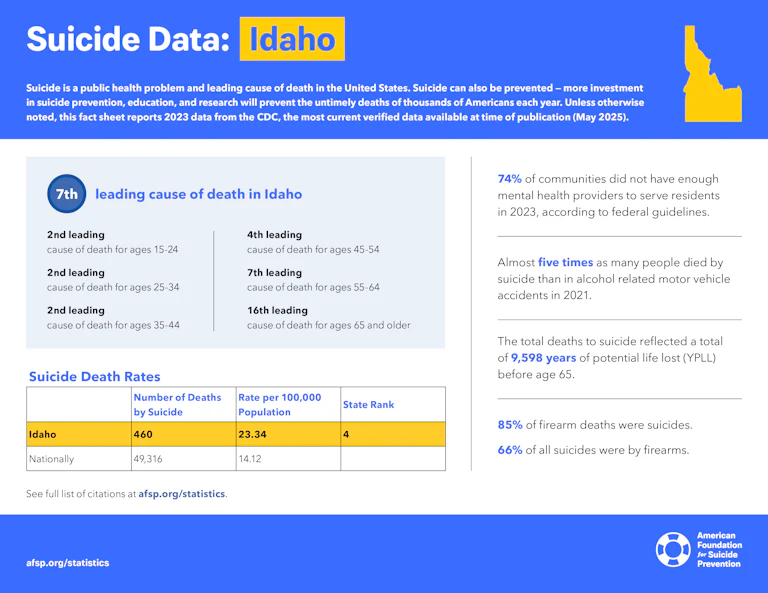Idaho

Idaho suicide prevention plans and initiatives
In 2006, the Governor established the Idaho Council on Suicide Prevention to oversee the implementation of the Idaho Suicide Prevention Plan, ensure the continued relevance of the plan by evaluating, implementing, and developing changes and new priorities, be a proponent for suicide prevention in Idaho, and prepare an annual report on plan implementation for the Governor and Legislature. The Idaho Suicide Prevention Program (§ 56-1003) was established by the Legislature in 2016 within the Division of Public Health in the Idaho Department of Health and Welfare (DHW) and provides information on trainings, crisis centers and hotline services, and community recovery centers.
In March 2018, the Legislature directed the Council to convene a stakeholder group, later named the Idaho Suicide Prevention Action Collective (ISPAC), to facilitate the development of a new state plan and accompanying budget request, with administrative support from DHW. In May 2019, the Idaho Suicide Prevention Plan 2019-2023 was published, and the Council released its most recent annual report.
Idaho laws
Key:
- Required by law
- Encouraged by law
- No law in place
Crisis lines and 988 implementation
- Addresses 988 infrastructure and provides for telecom user fee
- Addresses 988 infrastructure but does not include telecom user fee
- 988 law limited to creating an exploratory commission, advisory committee, or task force
Mental health parity
- Public health plans (e.g., Medicaid) regularly submit parity compliance analyses to state regulators
- Private health plans (individual and group) regularly submit parity compliance analyses to state regulators
K – 12 school suicide prevention
- Inclusion of the 988 Suicide & Crisis Lifeline and/or other crisis line(s) on student ID cards
- Student allowances for excused mental health absences
- School personnel must report student suicide risk to a parent and/or guardian
- Suicide prevention and/or mental health training for certain school personnel, annual
- Suicide prevention and/or mental health training for certain school personnel, not annual
- Suicide prevention, intervention, and postvention policies/programming
- Student education on suicide prevention
Health professional training in suicide assessment, treatment and management
- Mental health professionals receive regular training
- Mental health professionals receive one time training
- Medical/surgical professionals receive regular training
- Medical/surgical professionals receive one time training
Conversion therapy bans
- Prohibits licensed/board certified mental health providers from engaging in conversion therapy with minors under 18 years of age
- Prohibits licensed/board certified mental health providers from engaging in conversion therapy with vulnerable adults
- Prohibits use of state funds for any purpose related to conversion therapy (e.g., conducting, making a referral for, or extending health benefits coverage for)
University and college campus suicide prevention
- Inclusion of the 988 Suicide & Crisis Lifeline and/or other crisis line(s) on student ID cards
- Students receive information on available mental health and/or suicide prevention services and/or resources
- Adoption of suicide prevention/awareness policy or program
Firearms
- Process for extreme risk protection orders (ERPOs)
- State voluntary do not sell list